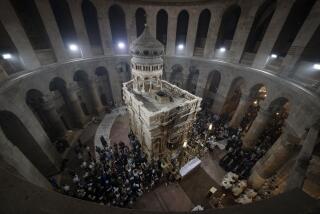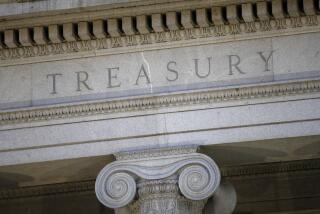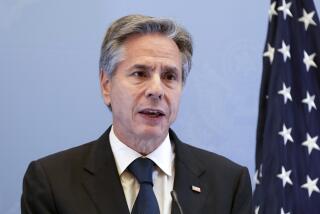THE NATION : U.S. moves to seize mosques : Federal prosecutors seek the forfeiture of Islamic centers and other properties allegedly tied to Iran’s nuclear program.
WASHINGTON — Federal authorities Thursday moved to seize an array of U.S.-based properties, bank accounts and religious sites that they charged in court documents were funneling money to an Iranian bank involved in that country’s suspected nuclear weapons program.
Prosecutors sought the forfeiture of assets that included Islamic centers and mosques in California, Maryland, New York City and Houston, as well as land in Virginia.
They also took steps to seize financial control of a 36-story office tower at 650 Fifth Ave. in Manhattan that they said was part of a business empire controlled by the Alavi Foundation. Prosecutors alleged that Alavi has been illegally “providing numerous services to the Iranian government” -- as well as a large amount of funds.
The properties and bank accounts being sought by the government in a civil lawsuit are worth more than $500 million and represent one of the largest attempted seizures of assets allegedly linked to Iran.
“As today’s complaint alleges in great detail, the Alavi Foundation has effectively been a front for the government of Iran,” U.S. Atty. Preet Bharara said in a statement. “For two decades, the Alavi Foundation’s affairs have been directed by various Iranian officials, including Iranian ambassadors to the United Nations, in violation of a series of American laws.”
Tenants and occupants of the properties “remain free to use the properties,” said Yusill Scribner, a spokeswoman for Bharara’s office. “There are no allegations of any wrongdoing on the part of any of these tenants or occupants.”
Daniel Ruzumna, a lawyer for Alavi, issued a statement late Thursday that said the foundation was “disappointed that the government decided to bring this civil forfeiture action. The foundation has been cooperating fully with the government since the investigation began. The foundation intends to litigate the government’s claims and expects to prevail.”
One U.S. official in Washington, who requested anonymity when discussing the case, said that the forfeiture action was not coordinated with the White House. It comes at a time when President Obama is stepping up diplomatic overtures to Iran in an attempt to get it to abandon its nuclear program.
In court documents, prosecutors said Alavi and a related entity were sending money to Bank Melli, which the Treasury Department alleged is owned by the Iranian government and being used to help build its weapons program. U.S. citizens, banks and businesses are barred from using Bank Melli.
A U.S. law known as the International Emergency Economic Powers Act, authorities said, allows properties to be seized as proceeds of violations of money-laundering statutes.
Thursday’s action appeared to be the latest move in a long and muddy case against Alavi that began unfolding last year with a grand jury investigation into the foundation’s relationship with Bank Melli.
The move was criticized by the Council on American-Islamic Relations, or CAIR, which said that a government effort to seize mosques was “unprecedented” and likely to have 1st Amendment implications.
“Whatever the details of the government’s case against the owners of the mosques, as a civil rights organization we are concerned that the seizure of American houses of worship could have a chilling effect on the religious freedom of citizens of all faiths and may send a negative message to Muslims worldwide,” CAIR spokesman Ibrahim Hooper said.
But others said a move by the government to take ownership of a mosque was not likely to raise a legal challenge.
UC Berkeley law professor Jesse Choper cited instances in which the Supreme Court upheld seizures of bookstores or theaters because they were said to be linked to crimes. “Whether it is seizing a mosque or seizing a bookstore, it doesn’t mean there is a special 1st Amendment scrutiny,” or protection, Choper said.
By nightfall Thursday, authorities had served papers on numerous locations.
In the Northern California town of Carmichael, authorities visited the Qoba Foundation, whose website described it as a Muslim organization “caring for spiritual needs of the community with a range of religious programs and educational activities.” The center said it performs Islamic marriages and burial services and provides certification of conversion to Islam, as well as family counseling.
The Alavi Foundation, according to its website, is a nonprofit organization formed in 1973 that makes contributions to nonprofits in the United States “that support interfaith harmony and promote Islamic culture and Persian language, literature and civilization.”
Most of the group’s money, the website said, comes from rental income from its Manhattan skyscraper. The building houses a variety of offices and shops, including Juicy Couture’s flagship clothing store.
Some counter-terrorism and nonproliferation officials hailed the enforcement action, saying it was part of a multifaceted administration effort to force Iran to the bargaining table over its nuclear program.
“What the U.S. government is doing with its relationship to Iran is mixing it up, like a boxer using different kinds of punches,” said Jonathan Winer, a State Department official during the Clinton administration who helped lead economic sanctions programs. “They are telling Iran that if you want to talk seriously to us, we are there to talk. And if you want to continue proliferation, we’re there to stop you.”
--
Times staff writers Tina Susman in New York, Shane Goldmacher in Carmichael, Calif., Patrick McGreevey in Sacramento and David G. Savage in the Washington bureau contributed to this report.
More to Read
Sign up for Essential California
The most important California stories and recommendations in your inbox every morning.
You may occasionally receive promotional content from the Los Angeles Times.










